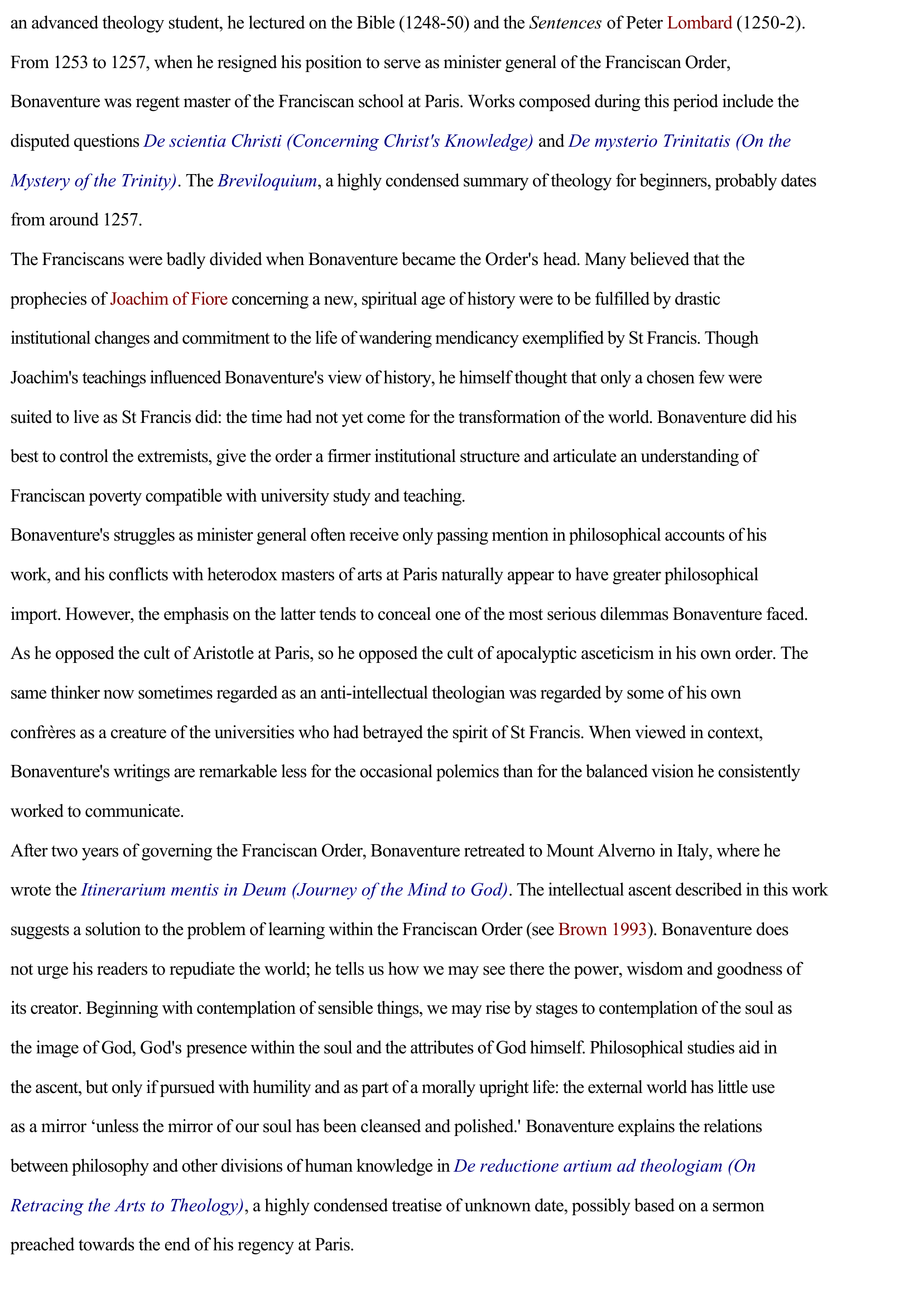Bonaventure
Publié le 22/02/2012

Extrait du document
«
an advanced theology student, he lectured on the Bible (1248-50) and the Sentences of Peter Lombard (1250-2).
From 1253 to 1257, when he resigned his position to serve as minister general of the Franciscan Order,
Bonaventure was regent master of the Franciscan school at Paris.
Works composed during this period include the
disputed questions De scientia Christi (Concerning Christ's Knowledge) and De mysterio Trinitatis (On the
Mystery of the Trinity) .
The Breviloquium , a highly condensed summary of theology for beginners, probably dates
from around 1257.
The Franciscans were badly divided when Bonaventure became the Order's head.
Many believed that the
prophecies of Joachim of Fiore concerning a new, spiritual age of history were to be fulfilled by drastic
institutional changes and commitment to the life of wandering mendicancy exemplified by St Francis.
Though
Joachim's teachings influenced Bonaventure's view of history, he himself thought that only a chosen few were
suited to live as St Francis did: the time had not yet come for the transformation of the world.
Bonaventure did his
best to control the extremists, give the order a firmer institutional structure and articulate an understanding of
Franciscan poverty compatible with university study and teaching.
Bonaventure's struggles as minister general often receive only passing mention in philosophical accounts of his
work, and his conflicts with heterodox masters of arts at Paris naturally appear to have greater philosophical
import.
However, the emphasis on the latter tends to conceal one of the most serious dilemmas Bonaventure faced.
As he opposed the cult of Aristotle at Paris, so he opposed the cult of apocalyptic asceticism in his own order.
The
same thinker now sometimes regarded as an anti-intellectual theologian was regarded by some of his own
confrères as a creature of the universities who had betrayed the spirit of St Francis.
When viewed in context,
Bonaventure's writings are remarkable less for the occasional polemics than for the balanced vision he consistently
worked to communicate.
After two years of governing the Franciscan Order, Bonaventure retreated to Mount Alverno in Italy, where he
wrote the Itinerarium mentis in Deum (Journey of the Mind to God) .
The intellectual ascent described in this work
suggests a solution to the problem of learning within the Franciscan Order (see Brown 1993 ).
Bonaventure does
not urge his readers to repudiate the world; he tells us how we may see there the power, wisdom and goodness of
its creator.
Beginning with contemplation of sensible things, we may rise by stages to contemplation of the soul as
the image of God, God's presence within the soul and the attributes of God himself.
Philosophical studies aid in
the ascent, but only if pursued with humility and as part of a morally upright life: the external world has little use
as a mirror ‘unless the mirror of our soul has been cleansed and polished. ' Bonaventure explains the relations
between philosophy and other divisions of human knowledge in De reductione artium ad theologiam (On
Retracing the Arts to Theology) , a highly condensed treatise of unknown date, possibly based on a sermon
preached towards the end of his regency at Paris..
»
↓↓↓ APERÇU DU DOCUMENT ↓↓↓
Liens utiles
- NOUVELLES RÉCRÉATIONS ET JOYEUX DEVIS de Bonaventure des Périers (résumé)
- Cymbalum MUNDI de Bonaventure des Périers (analyse détaillée)
- MÉMOIRES DE MONSIEUR JOSEPH PRUDHOMME - résumé - de Henri Bonaventure Monnier
- NOUVELLES RÉCRÉATIONS ET JOYEUX DEVIS (Les) de Bonaventure Despériers - résumé, analyse
- BONAVENTURE, Giovanni Fidanza, saint (1221-1274) C'est à Paris qu'il achève ses études vers 1236.

































